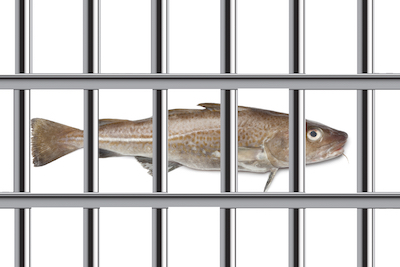When we think of extreme regulatory overreach what typically comes to mind? Healthcare, energy, transportation, finance, right? It would probably surprise most to learn that the contents of your fish tank are also a compelling state interest. The government is not only quite concerned with what you put in your aquarium but is equally fixated on the verbiage and layout of associated product labels. California, for example, imposes labeling standards related to the size, location and format of the content designation, that just like their automotive emission standards, invariably get imposed on every one else (manufacturers do not want to have multiple variants of the same product for different states). Next we have the various state agricultural agencies that rather obtusely extend their regulatory standards for farming into one’s ornamental aquarium. This is often done under the guise of “consumer protection” but mostly it is just folks that don’t seem to understand there is a difference between a cornfield and Nemo’s artificial domicile. Under the law products that help maintain freshwater aquarium plants are technically fertilizers. Products that nutritionally benefit non-plant species are considered feeds. This lack of nuance in the regulations then exposes manufacturers to a panoply of inane rules governing the formulation products, how the product may be described on its label and in sales literature, and even the precise layout and format of the content description.
And that is just the state governments. The Federal government’s effects fall into the seen/unseen category (stress on the “unseen” part). The EPA and FDA regulate pesticides and medicinal products respectively. The regulatory apparatus there is so onerous that most companies simply throw their hands up and avoid those categories entirely. As a manufacturer I can tell you that there are a number of products in those categories that could be introduced that would benefit the hobbyist, but, they will never see the light of day as it simply not worth spending hundreds of thousands if not millions to gain approval for a product that sells for under $10.
Unfortunately the Federal government is poised to introduce even greater regulatory burdens not only on the aquarium hobby, but on the entire pet care segment (fish, bird, reptile, small mammal) as well. The US House has just approved the COMPETES Act of 2022 (H.R. 4521). This act includes modification to the infamous Lacey Act that would drastically decrease species variety present in your local pet store by empowering the US Fish and Wildlife Service to impose even greater regulatory burdens (beyond those that already exist) on interstate transport of what some view as “problematic” species (previously they could only regulate importation into the US). Why they would need oversight of interstate transport of species that can’t even be imported into the US is unclear. This seems to be more of a pretext for expanding their authority for its own sake. Even more shockingly the existing ban on importation would be flipped from a blacklist to a whitelist method wherein ALL species would be banned for importation unless specifically whitelisted. The process of whitelisting would no doubt be lengthy, bureaucratic, and expensive. This is then effectively a near total ban on everything except goldfish and guppies. And it’s not solely for fish that are affected. This includes birds and reptiles as well. If this bill becomes law (the Senate is gearing up to vote on it as is, or reconcile it to their S.626 version introduced last summer) it would have a similar effect on the pet hobby that one might observe were we to ban all sports except tennis, or, ban all cars except the Ford Focus. With the loss of biodiversity and variety the pet hobby will whither and die and in a few years people will wonder why the only thing fish you can buy at Petsmart is a goldfish.
If you feel compelled to tell Congress “no” on these modifications of the Lacey Act (excise or modify Section 71102) please see this page for more details and simple contact form for your state’s Senators.
